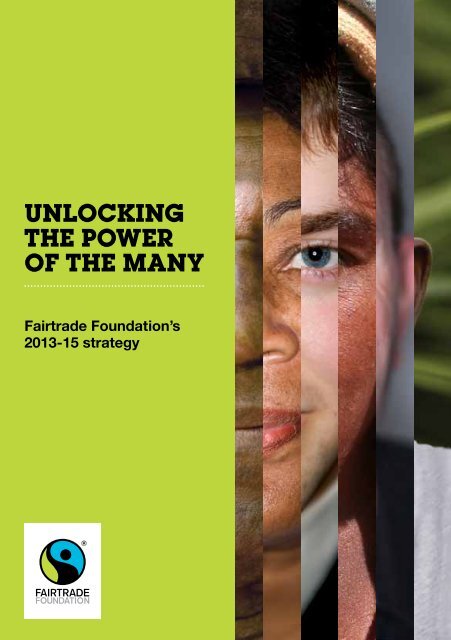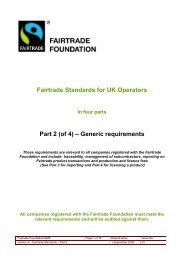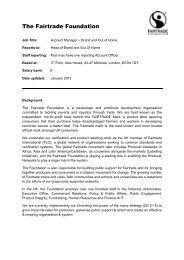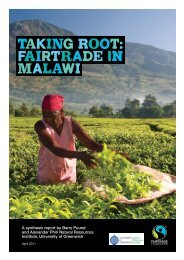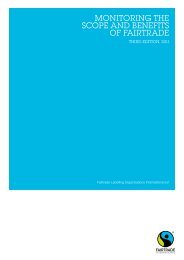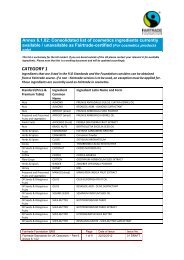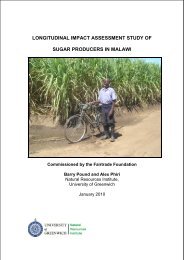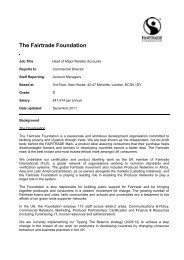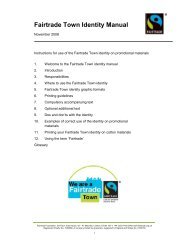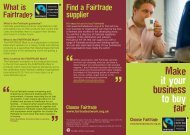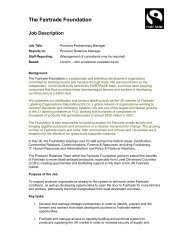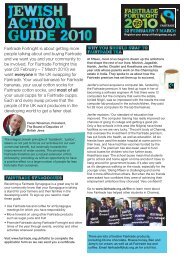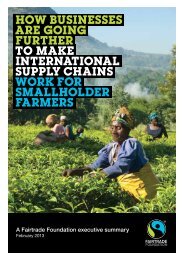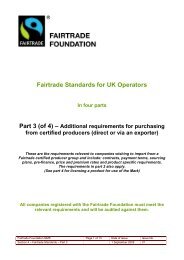UNLOCKING THE POWER OF THE MANY - The Fairtrade Foundation
UNLOCKING THE POWER OF THE MANY - The Fairtrade Foundation
UNLOCKING THE POWER OF THE MANY - The Fairtrade Foundation
Create successful ePaper yourself
Turn your PDF publications into a flip-book with our unique Google optimized e-Paper software.
<strong>UNLOCKING</strong><br />
<strong>THE</strong> <strong>POWER</strong><br />
<strong>OF</strong> <strong>THE</strong> <strong>MANY</strong><br />
<strong>Fairtrade</strong> <strong>Foundation</strong>’s<br />
2013-15 strategy
I am delighted to introduce our<br />
2013-15 strategy, Unlocking the<br />
Power of the Many.<br />
Over the last five years, <strong>Fairtrade</strong> sales<br />
in the UK have grown by 80 per cent<br />
from £836 million in 2008 to £1.5 billion<br />
in 2012. <strong>Fairtrade</strong> is firmly established<br />
in the mainstream markets.<br />
<strong>Fairtrade</strong> offers a model that has been<br />
shown to work; now we must improve<br />
its impact for farmers and workers and<br />
take it wider. Unlocking the Power<br />
of the Many catalyses the next phase<br />
of our development and is our<br />
springboard for the future.<br />
David Clayton-Smith,<br />
Chair, <strong>Fairtrade</strong> <strong>Foundation</strong> Board<br />
1<br />
Our vision<br />
Our vision is of a world in which<br />
justice and sustainable development<br />
are at the heart of trade structures and<br />
practices so that everyone, through<br />
their work, can maintain a decent and<br />
dignified livelihood and develop their<br />
full potential.<br />
Our mission<br />
<strong>The</strong> <strong>Foundation</strong>’s mission is to work<br />
with businesses, community groups<br />
and individuals to improve the trading<br />
position of producer organisations in<br />
the South and to deliver sustainable<br />
livelihoods for farmers, workers and<br />
their communities by:<br />
• being a passionate and ambitious<br />
development organisation<br />
committed to tackling poverty<br />
and injustice through trade<br />
• using certification and product<br />
labelling, through the FAIRTRADE<br />
Mark, as a tool for our<br />
development goals<br />
• bringing together producers<br />
and consumers in a citizens’<br />
movement for change<br />
• being recognised as the UK’s<br />
1<br />
leading authority on <strong>Fairtrade</strong>.<br />
2
Foreword by the<br />
Chief Executive,<br />
Michael Gidney<br />
<strong>Fairtrade</strong> has always been about<br />
the power of the possible. From<br />
campaigners cajoling local supermarket<br />
managers to stock the first <strong>Fairtrade</strong><br />
products, to the huge London 2012<br />
Games commitment to source 100 per<br />
cent <strong>Fairtrade</strong> tea, coffee, sugar and<br />
bananas, putting power into people’s<br />
hands has built a market for farmers<br />
and workers worth £1.5 billion in the<br />
UK – the biggest in the world.<br />
Five years ago, as part of our strategy<br />
to mainstream <strong>Fairtrade</strong>, we and our<br />
partners set out to expand the reach<br />
and impact of <strong>Fairtrade</strong> in Africa, a<br />
region then woefully underrepresented<br />
in international trade. Today, more than<br />
60 per cent of the 1.24 million farmers<br />
and workers involved in <strong>Fairtrade</strong> are in<br />
Africa. <strong>Fairtrade</strong> has helped create a<br />
more level playing field, but it’s farmers<br />
and workers themselves who have<br />
shown what can happen when they<br />
have a shot at the goal. Take the 8,000<br />
tea growers who own the Iria-ini Tea<br />
Factory in Kenya: they used the<br />
confidence and business prowess they<br />
gained from selling on <strong>Fairtrade</strong> terms<br />
to start packing their tea at source.<br />
3<br />
Leonido Manzueta, cocoa farmer,<br />
ConaCado Co-operative,<br />
dominican Republic
With support from the UK government and<br />
Marks & Spencer on their journey from tea<br />
pickers to packers, they now earn an extra<br />
$2-$3 per kilo, capturing more value where it<br />
is needed most. This in turn has inspired them<br />
to diversify into the local and regional market<br />
– theirs will be one of the first <strong>Fairtrade</strong><br />
certified products available in East Africa. It’s<br />
win-win – supermarkets get finished <strong>Fairtrade</strong><br />
tea and the farmers have a growing business,<br />
moving up the value chain and diversifying,<br />
balancing risk with opportunity in different<br />
markets. It’s just one example of the power<br />
of collaboration – putting value and<br />
ownership back into the hands of producers.<br />
And it is this dynamism and energy which<br />
enables <strong>Fairtrade</strong> to have such an impact.<br />
By 2012, <strong>Fairtrade</strong> turned 18 and came of<br />
age. <strong>The</strong> trailblazing path laid by Fair Trade<br />
Organisations Divine Chocolate, Traidcraft,<br />
Equal Exchange, Cafédirect and Fulwell Mill<br />
among others, was finally tipping into the<br />
mainstream, with major switches in tea, sugar,<br />
coffee and bananas by Co-op, Sainsbury’s,<br />
Waitrose and Morrisons, and several of the<br />
UK’s favourite brands – Ben & Jerry’s,<br />
Cadbury Dairy Milk, Tate & Lyle and KIT KAT<br />
converting to <strong>Fairtrade</strong>. <strong>Fairtrade</strong> campaigns<br />
had taken root in over 500 towns and cities,<br />
over 5,000 schools, 150 universities and<br />
colleges and 7,000 different faith groups, and<br />
recognition of the FAIRTRADE Mark had risen<br />
to 78 per cent, the highest of any ethical label.<br />
Our new strategy builds on this and<br />
recognises that together – producers,<br />
businesses and the UK public – we hold<br />
incredible power to deliver even greater<br />
impact and wider change, to learn from the<br />
past and adapt for the future. Let’s use it.<br />
Let’s unlock that power and change trade<br />
for good.<br />
5<br />
Tammy Stewart-Jones, campaigner,<br />
Thanet <strong>Fairtrade</strong> Island
<strong>Fairtrade</strong>: responding<br />
to a changing landscape<br />
In developing our new strategy, we need to respond<br />
to the rapidly changing context in which we work.<br />
2015 is the deadline for the achievement of the<br />
Millennium Development Goals. While there has been<br />
progress in tackling some aspects of poverty, such as<br />
primary school education and infant mortality rates,<br />
the reality for millions of farmers and workers remains<br />
one of extreme poverty, with families struggling<br />
to make a livelihood, living in communities without<br />
many basic services. <strong>The</strong> last few years have seen<br />
severe volatility in food, fuel and fertiliser prices.<br />
Smallholder farmers produce 70 per cent of the<br />
world’s food, but also make up half of the world’s<br />
hungry people. <strong>Fairtrade</strong> Premiums, which averaged<br />
over £68,000 per certified producer organisation in<br />
2011, are therefore still critical in their impact – from<br />
investing in food storage, to productivity and quality<br />
improvement, as well as vital community amenities.<br />
7<br />
Supporting sugar farmers<br />
to move up the value chain<br />
In 2011 the Manduvirá Co-operative in Paraguay<br />
began building a first-of-its-kind producer-owned mill.<br />
Now rather than paying transportation and rental<br />
costs to another factory over 100km away, this mill,<br />
partly financed by the <strong>Fairtrade</strong> Premium, will<br />
significantly improve the lives of sugar farmers,<br />
workers and their communities. Manduvirá is a<br />
perfect example of development through <strong>Fairtrade</strong>.<br />
Jake Mairs, campaigner,<br />
aquinas College, Stockport
Yet we must do more to address power imbalances in global<br />
trade. While global commodity prices in products such as<br />
cocoa, coffee and tea have grown overall, only a small<br />
proportion of this has trickled back into farming and working<br />
communities. Today, a cocoa farmer typically earns just 3-6<br />
per cent of the final price of a chocolate bar, compared to<br />
18 per cent in the 1980s. For millions more workers on farms<br />
and in factories, access to freedom of association or living<br />
wages continue to be out of reach. Impact research shows<br />
that while <strong>Fairtrade</strong> is delivering worker and farmer benefits,<br />
we can only unlock further and deeper progress on issues<br />
such as living wages or climate adaptation if we work with<br />
industry as a whole.<br />
In today’s hourglass economy, access to markets for<br />
millions of producers is only via a small number of traders,<br />
manufacturers and retailers, who in turn dominate market<br />
choices for millions of consumers. <strong>Fairtrade</strong> works inside this<br />
system, unlocking the opportunities for farmers and workers<br />
that large scale businesses can offer, but also outside<br />
it – widening trade channels through the development of<br />
alternative supply chains. We’ve got to get this balance right<br />
for continuing success and deeper impact for farmers<br />
and workers.<br />
In coffee 25<br />
million small<br />
farmers sell into<br />
a market of which<br />
40 per cent is<br />
controlled by just<br />
four traders.<br />
9<br />
MILLIONS<br />
<strong>OF</strong> FARMERS<br />
SELL TO:<br />
A HANDFUL<br />
<strong>OF</strong> COMPANIES<br />
WHO SELL TO:<br />
BILLIONS <strong>OF</strong><br />
CONSUMERS<br />
Tea picker,<br />
United nilgiri Tea Estates, India
Farming communities throughout the <strong>Fairtrade</strong> system and beyond<br />
are facing the effects of climate change. Changing rainfall and<br />
harvest patterns, rising temperatures and greater numbers of<br />
extreme weather events such as hurricanes and flooding, pose new<br />
challenges for farmers, for example the Windward Islands banana<br />
growers devastated by Hurricane Tomas in 2010, or the regular<br />
landslides affecting the coffee growers of the Gumutindo co-operative<br />
on Mount Elgon, Uganda. Many <strong>Fairtrade</strong> producer organisations<br />
are investing <strong>Fairtrade</strong> Premiums in climate resilience programmes<br />
such as planting more trees, exploring new crop varieties or investing<br />
in low-energy technologies. We need to rise to the challenge in the<br />
next few years, encouraging trading relationships that deliver<br />
investment in sustainable agriculture, diversification and adaptation.<br />
Over the past five years however, many more businesses have<br />
recognised the importance of sustainability and smallholder farming<br />
is rising up the business and political agenda, more than at any time<br />
in our history. We’ll have a predicted global population of 9 billion<br />
by 2050. In an increasingly resource-scarce world, this demands<br />
radical new ways of living, working and doing business.<br />
‘ <strong>The</strong> benefits of <strong>Fairtrade</strong> are much, much wider than just<br />
price – now I know how to export. If <strong>Fairtrade</strong> had not come<br />
in, we wouldn’t have known how to export. We have contacts<br />
in Europe who give us information on the markets. Before we<br />
didn’t know the language of futures, or markets – now that is<br />
also our language and we can impart a bit of that to the<br />
farmers. Now even the farmers ask about the price in London!<br />
John Kanjagaile, Export Manager, KCU<br />
11<br />
Kagera Coffee Co-operative Union Ltd (KCU),<br />
Tanzania<br />
’<br />
Robert Egglestone, campaigner,<br />
Burgess Hill <strong>Fairtrade</strong> Town Steering Group
Here in the UK, a tough economic environment since 2008 means shoppers<br />
are watching food prices and worrying about domestic concerns. However,<br />
consumers also expect more from companies than ever before and the<br />
pressure on business to act responsibly and put sustainability at the heart<br />
of what they do has also intensified, including how they treat the farmers<br />
and workers who supply them. Today, more than 500 <strong>Fairtrade</strong> Towns have<br />
been joined by the rise of a vibrant transition movement, Eco-Schools, tax<br />
justice campaigns and more, all working to bring global and local concerns<br />
together. This offers a powerful opportunity for us to unlock the power of<br />
the UK public and connect farmers to consumers in innovative ways, taking<br />
advantages of huge shifts in mobile and digital technology for farmers and<br />
consumers alike.<br />
In this context, our new strategy is to build on the success to date, to learn,<br />
improve and strengthen our work for the future and unlock the power of<br />
the millions of farmers and workers, thousands of business partners and<br />
millions of <strong>Fairtrade</strong> supporters with whom we work.<br />
‘ <strong>The</strong> great thing about <strong>Fairtrade</strong><br />
is that it enables cocoa farmers<br />
like me to have a say in shaping<br />
our future through talking and<br />
working directly with retailers<br />
and companies. Our biggest<br />
worry is ensuring that we have a<br />
guaranteed market for our cocoa<br />
that provides us with long-term<br />
sustainable livelihoods. Through<br />
the pricing structure and the<br />
<strong>Fairtrade</strong> Premium we will be<br />
able to invest in both our<br />
business and our community to<br />
ensure a brighter future for our<br />
family, other farmers and<br />
our friends. ’<br />
Santos Mendoza, CONACADO<br />
13<br />
CONACADO, the National Confederation of<br />
Dominican Cocoa Producers, Dominican Republic<br />
Moses Rene, banana farmer,<br />
WInFa, Saint Lucia
15<br />
<strong>Fairtrade</strong>: building a model for change<br />
We are a member of a growing<br />
international network of <strong>Fairtrade</strong><br />
organisations, united by a common<br />
strategic framework.<br />
We believe we have a unique model<br />
of change, operating simultaneously<br />
across four spheres of influence<br />
– from the farmer and worker<br />
organisations who now own 50 per<br />
cent of our system, to businesses<br />
Supply<br />
chain<br />
business<br />
practices<br />
Small producer<br />
and worker<br />
organisations<br />
FAIRTRADE<br />
GOALS<br />
Consumer<br />
behaviour<br />
involved in <strong>Fairtrade</strong> supply chains,<br />
community groups, NGOs and<br />
campaigners who build civil society<br />
awareness and action for wider<br />
policy change and ordinary people<br />
purchasing <strong>Fairtrade</strong> products. By<br />
connecting these, we hope to create<br />
a virtuous circle of collaborative<br />
action to make a real difference<br />
for the communities involved in<br />
<strong>Fairtrade</strong> and even beyond.<br />
Civil<br />
society<br />
action<br />
Our goals for 2013-15<br />
Over the next three years we will build on our success and focus on the<br />
following three goals:<br />
1. Increase impact and sales for producers<br />
2. Galvanise public support and action<br />
3. Cultivate an inspiring and effective organisation<br />
16
17<br />
GOAL 1 Increase impact and sales for producers<br />
We will unlock the power of<br />
companies to deliver impact for<br />
farmers and workers through<br />
<strong>Fairtrade</strong> product certification<br />
and the FAIRTRADE Mark.<br />
Coffee, tea, bananas, cocoa and<br />
sugar still deliver the bulk of producer<br />
sales and <strong>Fairtrade</strong> Premiums, and<br />
the UK remains the most important<br />
<strong>Fairtrade</strong> market globally for many of<br />
these. <strong>The</strong>y’re still our core priorities,<br />
developing our expertise in making<br />
trade really work to reduce poverty.<br />
We will focus on achieving deeper<br />
impact and stronger business<br />
partnerships in existing products,<br />
rather than introducing lots of new<br />
product categories in the next<br />
three years.<br />
One in three bananas sold in the UK<br />
is <strong>Fairtrade</strong>. We believe we could<br />
make this one in two by 2015. For<br />
coffee, the café, restaurant and<br />
out-of-home sector in particular<br />
still offers many opportunities to<br />
increase <strong>Fairtrade</strong> sales for farmers.<br />
For <strong>Fairtrade</strong> chocolate and sugar<br />
– which is now estimated to be 40<br />
per cent of the UK market – we now<br />
want to ensure <strong>Fairtrade</strong> growth<br />
leads to lasting change for farming<br />
communities.<br />
We will unlock new partnerships<br />
with business to go further<br />
with <strong>Fairtrade</strong>.<br />
<strong>The</strong> world of certification and<br />
sustainable sourcing is rapidly<br />
changing. As well as extending our<br />
existing model we will explore new<br />
ways of building partnerships with<br />
business in products such as cocoa,<br />
sugar and cotton to unlock greater<br />
commitments to buy from farmers<br />
and workers on <strong>Fairtrade</strong> terms.<br />
Our ambition is to triple the volumes<br />
of <strong>Fairtrade</strong> cotton sold in the UK<br />
by 2015. We will also continue to<br />
nurture newer products, such as<br />
<strong>Fairtrade</strong> and Fairmined certified<br />
gold and silver.<br />
Fair Trade Organisations continue<br />
to play a unique and vital role,<br />
demonstrating how to do business<br />
differently and put development at<br />
the heart of the trading relationship.<br />
We will work closely with them to<br />
find innovative ways to tell their<br />
unique story to consumers and bring<br />
the benefits of <strong>Fairtrade</strong> to the most<br />
marginalised farmers and workers.<br />
We will challenge, support and<br />
incentivise businesses to unlock<br />
deeper impact and commitment.<br />
We work with over 450 companies<br />
so we and our partners are uniquely<br />
placed to deliver real impact for<br />
farmers and workers. We want to<br />
deepen and create new partnerships<br />
with businesses that go beyond<br />
minimum <strong>Fairtrade</strong> standards,<br />
including investments in developing<br />
supply chains that add more value<br />
for farmers, workers and their<br />
communities, or that strengthen<br />
relationships with smallholder farmer<br />
organisations as trading partners.<br />
Elisa Zacharia, tea farmer,<br />
Eastern outgrowers Trust, Malawi<br />
By 2015<br />
•<br />
UK <strong>Fairtrade</strong> sales will increase from<br />
about £1.5bn to over £2bn and annual<br />
<strong>Fairtrade</strong> Premiums from sales will<br />
increase from £23m to over £31m
19<br />
GOAL 2 Galvanise public support and action<br />
We will unlock the power of the<br />
grassroots movement.<br />
<strong>Fairtrade</strong> is backed by one of<br />
the most dynamic grassroots<br />
movements in the UK, ordinary<br />
people who have worked to build<br />
public awareness of the FAIRTRADE<br />
Mark beyond any other ethical label,<br />
engaging local communities in<br />
<strong>Fairtrade</strong> in ever more creative<br />
and inventive ways.<br />
<strong>Fairtrade</strong> campaign groups are<br />
developing their own joint local<br />
campaigns and we will support this,<br />
through development of 12 regional<br />
campaign networks, with a voice<br />
into the <strong>Fairtrade</strong> <strong>Foundation</strong>. We<br />
will also focus on the next generation<br />
of <strong>Fairtrade</strong> activists, working with<br />
schools, universities and student<br />
organisations to deliver youth-led<br />
campaigning. Overall, our target is<br />
to increase the number of local<br />
campaigns groups from 8,600<br />
today to 11,000 by 2015.<br />
We will unlock the power of the<br />
public and <strong>Fairtrade</strong> supporters<br />
to bring about long-term change<br />
on trade.<br />
In 2013, we will also unlock the<br />
power of our grassroots movement<br />
to deliver wider change, with the<br />
launch of a new three-year Make<br />
Food Fair campaign.<br />
This will tackle some of the<br />
structural injustices in food supply<br />
chains and encourage fair and<br />
responsible consumption of food.<br />
Recognising the scale of UK public<br />
support for <strong>Fairtrade</strong>, we will create<br />
more opportunities for individuals<br />
to support <strong>Fairtrade</strong> through<br />
purchasing, campaigning and<br />
donating, aiming to increase our<br />
active supporter base from 100,000<br />
to 500,000 by the end of 2015.<br />
Underpinned by more sophisticated<br />
consumer insight we will target joint<br />
campaigns more effectively with the<br />
businesses we work with too. We<br />
will also develop more international<br />
marketing and PR campaigns with<br />
<strong>Fairtrade</strong> organisations across the<br />
world, with the first launching in<br />
autumn 2013.<br />
We must maintain relevance and<br />
trust in the FAIRTRADE Mark, so<br />
it’s critical we communicate the<br />
impact <strong>Fairtrade</strong> is making, as well<br />
as the challenges we still face. We<br />
will draw on independent research<br />
and impact assessment, as well<br />
as digital technology, and a new<br />
media strategy, so that farmers<br />
and workers can communicate<br />
more directly with the UK public.<br />
In 2014, we will celebrate the 20th<br />
anniversary of <strong>Fairtrade</strong> products<br />
in the UK, a good time to reflect<br />
on success, but also to bring the<br />
<strong>Fairtrade</strong> movement together to<br />
learn and look to the future.<br />
Jubilee Primary School,<br />
<strong>Fairtrade</strong> School, London<br />
By 2015<br />
•<br />
•<br />
Half a million people will be actively<br />
engaged and pushing for faster and<br />
deeper change<br />
Over 50 per cent of the population<br />
will be actively choosing <strong>Fairtrade</strong>
21<br />
GOAL 3 Cultivate an inspiring and effective<br />
organisation<br />
We will unlock the power of our<br />
organisation and our people.<br />
We’ll only be able to deliver impact<br />
and sales for farmers and workers<br />
and fire up the public to take<br />
action if we cultivate an inspiring<br />
and effective organisation, part of<br />
an efficient and well connected<br />
international <strong>Fairtrade</strong> system.<br />
Impact is central to our strategy.<br />
We will put what we have learned<br />
from our impact assessment and<br />
research into strategic planning and<br />
business relationships and publish<br />
social impact reports, available<br />
from 2014.<br />
We recognise our people are<br />
passionate and committed and we<br />
will invest in staff and the working<br />
environment and build a learning<br />
organisation.<br />
We will be effective and accountable<br />
to those who invest in us, using well<br />
designed, straightforward systems<br />
and processes, underpinned by<br />
robust information and data. We<br />
will make it easier and simpler for<br />
partners to work with us and<br />
improve our internal systems and<br />
the way we work to be more efficient<br />
and make informed decisions.<br />
We’re the largest <strong>Fairtrade</strong><br />
organisation within an interdependent<br />
network of <strong>Fairtrade</strong> organisations,<br />
so we have an important role. We<br />
will increase our collaboration<br />
internationally and champion<br />
development of a global financial<br />
and planning model, to reduce<br />
duplication and secure increased<br />
investment for our work with farmers<br />
and workers in developing countries.<br />
Our Values<br />
OPTIMISM<br />
ACTION<br />
INTEGRITY<br />
RESPECT<br />
CHALLENGE<br />
Call to action to Unlock the Power of Many<br />
<strong>The</strong> job is not done. We need to work together to make our vision a<br />
reality. Together we can unlock the power of the many.<br />
• We ask farmers and workers and their networks to work closely with us,<br />
to guide our direction, challenge us and help us inspire people in the UK<br />
to deliver more for smallholders, workers and artisanal miners.<br />
• We encourage business partners to go further with us to make <strong>Fairtrade</strong><br />
values and practices part of their sourcing plans, their trading relationships<br />
and their communications with their customers.<br />
• We call on the public to go further to turn awareness of <strong>Fairtrade</strong> into<br />
action – so that more demand leads to more products being traded more<br />
fairly as the norm.<br />
• We invite <strong>Fairtrade</strong> supporters and campaign groups, our member<br />
organisations, trade unions and NGOs to work with us to make the<br />
<strong>Fairtrade</strong> movement an even bigger, louder force for change in calling<br />
for a fairer and more sustainable food system.<br />
• We ask donors and governments to work with <strong>Fairtrade</strong> to expand and<br />
deepen its impact for producers and to channel investment in ways that<br />
puts power back into the hands of farmers, workers and miners.<br />
Luton <strong>Fairtrade</strong> Town – an act of faith<br />
Luton’s campaign is a truly<br />
cross-community effort, involving<br />
people of all ages, from many<br />
different ethnicities and faiths –<br />
including Muslims, Sikhs, Hindus,<br />
Jews, Christians and people with<br />
no particular faith affiliation.<br />
From hosting a <strong>Fairtrade</strong> banana<br />
farmer and a <strong>Fairtrade</strong> football<br />
tournament, to producing local<br />
resources, working with<br />
Bedfordshire University and<br />
schools, Luton’s creative<br />
community approach was<br />
rewarded with the Outstanding<br />
Achievement trophy in 2012’s<br />
<strong>Fairtrade</strong> Campaigning Awards.
‘<br />
A huge difference in our<br />
lives is that now our children<br />
can actually go to school,<br />
our coffee is being recognised<br />
in the market for the quality<br />
we produce, and our members<br />
can be proud again to<br />
be farmers.<br />
CENFROCAFE<br />
(Central Fronteriza del Norte de Cafetaleros), Peru<br />
Thank you<br />
’<br />
Our 2013-15 strategy was developed between June 2011 – December 2012 through<br />
extensive external and internal consultation. We would especially like to thank our<br />
Board of Trustees and the external contributors to our Board away day in June 2011.<br />
<strong>Fairtrade</strong> <strong>Foundation</strong>, 3rd Floor, Ibex House,<br />
42-47 Minories, London EC3N 1DY<br />
T: +44 (0) 20 7405 5942 F: +44 (0) 20 7977 0101<br />
W: www.fairtrade.org.uk E: mail@fairtrade.org.uk<br />
<strong>The</strong> <strong>Fairtrade</strong> <strong>Foundation</strong> Registered Charity Number: 1043886.<br />
VAT Reg No: 672 5453 23. Company Reg. in England & Wales No. 2733136<br />
Photography credits: Simon Rawles, Anette Kay, Eduardo Martino, Riccardo Gangale,<br />
<strong>Fairtrade</strong> International, <strong>Fairtrade</strong> Austria, Luton Council of Faiths, Walter Astrada


